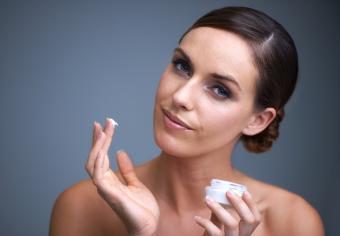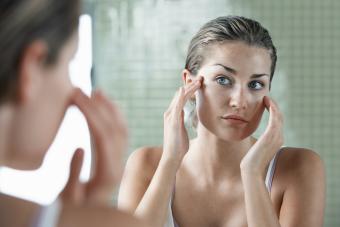
Collagen decreases in the skin as an inevitable result of aging and from the preventable consequence of sun damage and neglect. Liquid collagen skin supplements are said to replace that lost collagen so our skin stays smooth and looking young, and studies show promising benefits. However, as with many other 'anti-aging' ingredients, there is not enough medical evidence to support this claim completely.
The Claim for Collagen Supplements
Collagen supports the skin's structure and form to keep it from sagging and wrinkling. When applied to the skin, it is difficult for this large molecule to penetrate the outer layer, which is the stratum corneum, to reach the dermis, which is where collagen is made. Liquid collagen skin supplements are taken by mouth rather than being applied to the skin.
Makers claim that liquid collagen supplements will find their way from "the inside out" to the skin's dermis to boost collagen production by fibroblast cells there, therefore keeping skin looking younger. They are supposed to decrease the furrows, wrinkles and dryness that come from the loss of or damage to collagen from aging, sun and other environmental agents.
Collagen Digestion and Amino Acid Absorption
Liquid collagen, like other dietary proteins, get chewed up by enzymes in the gut and broken down into amino acids before they are absorbed into the blood stream. A 2005 study reported in the Journal of Agricultural and Food Chemistry suggests that ingested protein from collagen supplements can be identified as reassembled peptides in the blood.
These peptides should then travel to the skin to increase collagen synthesis. However, it doesn't matter to the body where collagen comes from because the gut processes all of it the same way. Therefore, it's not clear how the supplement is better than any other source of protein from a healthy diet; the body breaks it all down to absorbable and usable amino acids.
Peptides and Collagen Production
Dietary liquid collagen skin supplements are made from collagen that comes mostly from chickens or cows. The collagen is hydrolyzed and broken up into fragments of peptides and amino acids. Peptides are currently a desirable ingredient for manufacturers of 'anti-aging' potions.
Studies show that fragments of peptides normally present in skin act as signals to stimulate production of collagen and other proteins. There are also studies in the lab that show further evidence that a collagen peptide can increase collagen synthesis. It is thought that taking dietary collagen supplements should do the same thing in the skin and elsewhere in the body.
It is not clear, however, if hydrolyzed collagen taken by mouth presents itself to the dermis as peptides reassembled from the amino acids, all derived just from the supplements. It is more likely that it is amino acids that reach the skin and it can't tell what the dietary source was and it makes no difference.
Studies on Hydrolyzed Collagen
There are no studies that show what form liquid collagen supplements are in when they reach the skin. Only a few clinical studies show how effective the actual products are.
- A study reported in Skin Pharmacology and Physiology in 2014 compared 23 women ages 35 to 55 who were given a collagen hydrolysate for eight weeks to 23 women given a placebo. The authors found that skin elasticity improved in the treated women compared to the control group.
- In another 2014 study reported in the same journal by the same authors, 57 women ages 45 to 65 were treated with a collagen peptide and a similar group of 57 women received a placebo for eight weeks. The authors reported a decrease in wrinkles and an increase in procollagen type 1 and elastin in the treated women.
- In a study reported in Clinical Intervention in Aging in 2014, the supplement Pure Gold Collagen® was given daily for 60 days. There was an improvement in skin dryness and firmness.
- In 2012, the same journal published a study funded by the makers of BioCell Collagen™ (BCC). Twenty six women took BCC capsules made from hydrolyzed chicken collagen two times daily for 12 weeks. All had improvement in skin dryness, lines and wrinkles.
There are also some studies showing benefit from collagen hydrolysates in improving rheumatoid arthritis and osteoarthritis. However, more studies on commercial liquid collagen skin supplements are needed to show further proof of benefit in skin.
The Safety of Collagen Supplements
There is not a lot of information on the safety of hydrolyzed protein for human consumption therefore the risks are unknown. Potential risks of collagen supplements include food sensitivities, allergies, or other adverse reactions to the collagen, the additives, or to unknown contaminants. However, none of the clinical studies reviewed reported any unpleasant or adverse risks or side effects, nor were there any mentioned in consumer reviews of the products.
Lacking sufficient information, before you take these supplements look at the list of ingredients and find out as much information as you can before taking them. Dietary supplements are regulated by the Food and Drug Administration (FDA). However, safety information is often lacking from dietary products because they are not held to the same standard of proof that medicines are. You can find more general information on how to understand dietary supplements on the National Institutes of Health website.
A Selection of Liquid Collagen
If you decide to take liquid collagen skin supplements be sure that you buy from a reputable pharmacy or store. The available liquid collagen products are formulated for skin as well as hair, nails, muscle and joints. Liquid collagen does not have a pleasant taste, so manufacturers add various juices to improve it. Reviewers often comment on the sweetness of these products.
The products listed here have all received favorable consumer reviews. Based on the clinical studies you should start to see an effect in eight to twelve weeks.
- NeoCell Collagen + C™ Pomegranate Liquid contains vitamin C and is sweetened by a number of juices. Take one tablespoon alone or mix with six ounces of water, juice or herbal tea. Wait 30 minutes before eating. It sells for around $20 for 12 ounces.
- Applied Nutrition Liquid Collagen Skin Revitalization® has Biotin and three vitamins. Add one dose tube to 16 ounces of water and drink once a day. A pack of ten dose tubes costs around $10.
- LifeTime Liquid Collagen® With Vitamin C is mixed with sweeteners and is taken by drinking one tablespoon added to eight ounces of water daily. It retails for just over $26 for 16 ounces.
- Swanson Ultra Beauty Drink Mix with Verisol® Bioactive Collagen Peptides contains apple and Stevia flavoring. Dissolve one packet in eight ounces of water and drink once a day. Thirty packets (one-ounce each) sell for about $20.
- Pure Gold Collagen® contains vitamins B, C and E, biotin, soy, zinc, copper and artificial sweeteners. Note that this product is made from hydrolyzed fish collagen so don't use if you are allergic to fish. To use, drink one 50 ml bottle on an empty stomach. You can order it online from the company. A ten day trial costs around $50.
The Promise and Prevention
The few available small clinical studies show the promise of collagen supplements to reduce the visible signs of skin aging. However, more and larger studies are needed to demonstrate their benefits and safety and to determine how they compare to other anti-wrinkle skin care ingredients, such as retinoids.







